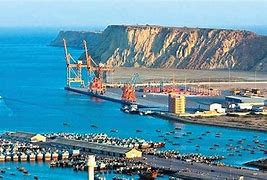Pakistan’s Minister for Economic Affairs, Omar Ayub has said that Islamabad and Beijing are entering the next phase of CPEC under which SEZs are being established in the country. During a virtual meeting of the Pakistan-China Joint Committee on Economic, Trade, Scientific and Technical Cooperation, Minister Ayub said that SEZs will prove helpful in attracting FDI, and establishing industrial units, and boosting trade. He also highlighted that Chinese investors can benefit from the huge potential of Pakistan’s industrial sector, and that Gwadar will help uplift the country’s trade sector.
Islamabad and Beijing are entering the next phase of China-Pakistan Economic Corridor (CPEC) under which Special Economic Zones (SEZs) are being established in the country, said Minister for Economic Affairs Omar Ayub.
Speaking at a virtual meeting of the Pakistan-China Joint Committee on Economic, Trade, Scientific and Technical Cooperation on Wednesday, he said that SEZs would prove helpful in attracting foreign direct investment (FDI) and establishing industrial units.
“Moreover, the SEZs will boost employment opportunities and accelerate economic activities,” he said. “Similarly, the operationalisation of Gwadar Port will lift external trade.”
He noted that China had been Pakistan’s largest trading partner for the past six years, since 2015. At present, China is Pakistan’s main source of imports and the second largest export destination.
The minister for economic affairs highlighted that Pakistan provided immense investment opportunities in diverse sectors.
“Pakistan provides a conducive and liberal investment environment to foreign investors and entrepreneurs,” he said. “All foreign investments are fully protected under the Foreign Private Investment Promotion and Protection Act 1976 and Protection of Economic Reforms Act 1992.”
SEZs were being established to meet the global challenges of competitiveness with state-of-the-art infrastructure and connectivity, the minister was quoted as saying in a statement.
The incentive package for SEZs includes exemption from income tax for 10 years and one-time exemption from all customs duties and taxes on the import of capital goods.
He emphasised that textile, leather, pharmaceutical and surgical instrument industries of Pakistan were among the best in the world and their products were exported all over the globe.
“Chinese investors can benefit from the huge potential of Pakistan’s industrial sector,” said the minister.
“In this regard, the Small and Medium Enterprises Development Authority (Smeda) and the Board of Investment can collaborate with their Chinese counterparts to enhance cooperation in the industrial sector.”
Ayub called agriculture a vital sector of the economy as it was directly related to food security and rural development.
“Pakistan is looking forward for mutual cooperation in the areas of agricultural research, crop productivity, value addition and food processing through the establishment of joint ventures and business-to-business contacts,” the minister told the Chinese official.
The meeting was co-chaired by Vice Minister of China Ren Hongbin and Economic Affairs Division Secretary Mian Asad Hayauddin.
Both sides discussed matters pertaining to projects in energy, infrastructure and social sectors. They agreed to promote investment and industrial cooperation on a fast-track basis.
On the occasion, Hayauddin shared his views regarding strengthening of trade cooperation, exchange of experiences in the context of poverty alleviation and establishment of joint working groups. He appreciated the measures taken by the Chinese government to tackle the Covid-19 pandemic.
The two sides discussed the deepening of cooperation under a multilateral framework.
In his remarks, Vice Minister of China Ren Hongbin said that fruitful discussions on economic relations between delegates of the two countries would fulfill the objectives of deepening bilateral relationship.
















